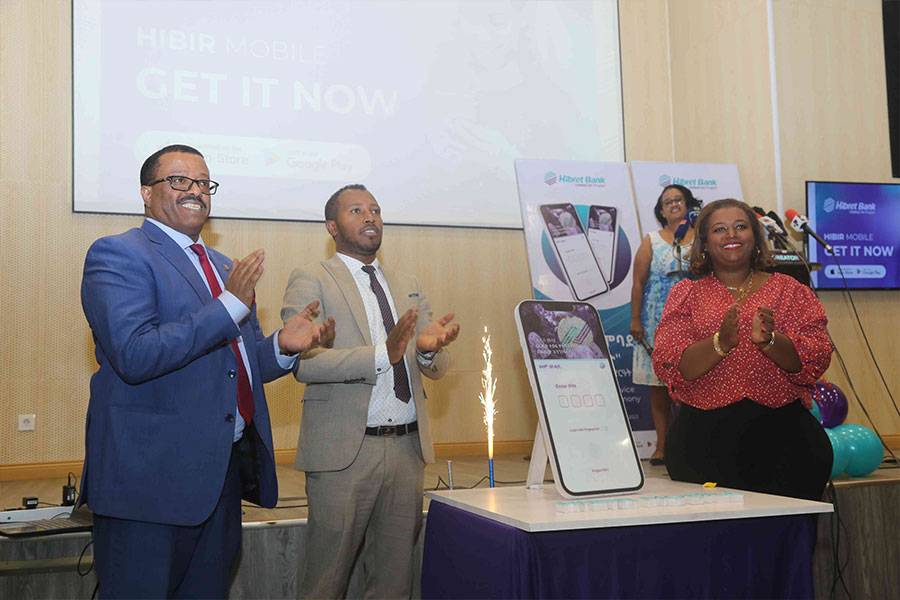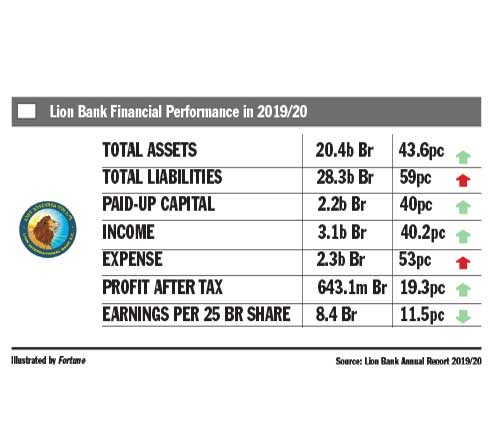
For thousands of Hibret Bank's shareholders who congregated at the Inter-luxury Hotel in November for a general assembly and marked their bank's service for a quarter of a century, praising profit ought to have been a somewhat melancholy mood. The Bank's net profit could not translate into earnings per share.
Hibret Bank's return on shares dropped by 2.2 Br to 26.47 Br, a trend observed over the past few years.
Abdulmenan Mohammed, a financial statement analyst based in London, pointed toward slower profit growth combined with more capital injection as the Bank's President, Melaku Kebede, attributed the decline to the provision set aside to securing non-performing loans disbursed through 28 branches in the Tigray Regional State.
Hibret Bank's losses due to the civil war in the northern part of the country ignited in November 2020 could be considered modest compared to some of its peers, such as Wegegen and Lion banks. The size of its non-performing loans (NPL) remains at 2.8pc, lower by 1.1 percentage points from the average for eight banks in its league.
Melaku's is a view concurred by Samrawit Getamessay, board chairwoman, who said the economy faced daunting challenges during the year, the most severe being the war in the north. Shareholders agreed.
Fasil Terefe is one of the 5,500 shareholders who inherited 1.1 million Br shares from his father seven years ago. He acknowledged the stress the broader economy put. However, he remained unimpressed with the Bank's performance, witnessing a 21.2pc dividend while hoping for additional 10 percentage points. He believes the Bank is wavering in developing innovative digital banking products which could differentiate it from competitors.
Melaku, whose background is in information technology, argued that the Bank has implemented digital banking and introduced innovative products.
Hibret Bank's profit may have increased from previous years; dividends have not seen a significant jump as shareholders like Fasil would have expected due to massive capital injection, the Bank's President conceded.
Incorporated in 1998 with 21.3 million Br paid up capital raised from 352 shareholders, Hibret Bank shareholders have resolved to increase capital to 20 billion Br in the next five years. It is an industry-wide response to the central bank's decision to push commercial banks to reach five billion Birr in four years. With 4.3 billion Br paid up capital, an increase of 11.1pc from the previous year, Hibret has a capital adequacy ratio (CAR) of 15.4pc, indicating it is a well-capitalised bank against the eight percent floor set by regulators at the central bank.
Its net profit of 1.09 billion Br from its operations last year (up by 5.3pc from the previous year) was a little more than half the average for the eight most prominent private banks in the industry, with Awash (5.3 billion Br), Cooperative Bank of Oromia (2.04 billion Br), Bank of Abyssinia (3.2 billion Br) and Dashen Bank (2.9 billion Br) huddling to the front. If there would be a consolation for Hibret's executives, their profit size is double the amount posted by Wegagen Bank.
Under Melaku's management, Hibret opened 40 more service outlets in the past year, bringing its outreach to 423. It recruited 552 new employees in the reported year, bringing its workforce to 7,659.
The Bank has generated massive income from financial and non-financial intermediation activities, growing interests on loans, advances and investments in securities to 6.68 billion Br, an increase of 65.4pc. Its loan-to-deposit ratio went up by three percentage points to 84pc, equal to the average of the eight banks. The Bank of Abyssinia and Dashen Bank recorded the highest percentages of 91pc and 87pc, respectively.
Revenues from commission and services charges grew by 38.9pc to 1.3 billion Br.
"The executives should be appreciated for significantly growing their income," said Abdulmenan.
An upsurge in expenses accompanied the income increase.
Expenses on interests (2.31 billion Br) registered a modest growth of 8.9pc, compared to the swell in interest income.
General administration expenses increased by 36.9pc and salaries and benefits went up by 43.2pc. The significant increases in general administration (1.52 billion Bwagesries and benefits (1.69 billion Br) expenses undermined the performance achieved in revenue generation.
"It's due to 35pc salary increment," Melaku told Fortune.
This needs the watchful eyes of the management, according to the expert.
Even though the Bank records show an increase in operating expenses, it is much lower than the 4.8 billion Br average for the eight private banks.
Hibret's liquidity position saw headway in cash and bank balance (10.66 billion Br), growing by 56.6pc.
The total assets of Hibret Bank expanded to 67.41 billion Br, higher by 24.6pc from the previous years but only 65pc of the average for its peers. Twice lower than the Awash Bank, Hibret Bank's liabilities are seven billion Birr less than its total asset and two-thirds of the 92.3 billion Br average the eight banks posted. Its deposit mobilisation soared to 53.8 billion Br, the fifth largest among the eight, following Awash (148 billion Br), Abyssinia (122 billion Br), Oromia Coop (96.7 billion Br) and Dashen (91.2 billion Br).
PUBLISHED ON
Feb 04,2023 [ VOL
23 , NO
1188]

Radar | Mar 11,2023

Fortune News | Mar 13,2021

Radar | Jan 21,2023

Radar | Jun 01,2019

Radar | Sep 07,2025

Dec 22 , 2024 . By TIZITA SHEWAFERAW
Charged with transforming colossal state-owned enterprises into modern and competitiv...

Aug 18 , 2024 . By AKSAH ITALO
Although predictable Yonas Zerihun's job in the ride-hailing service is not immune to...

Jul 28 , 2024 . By TIZITA SHEWAFERAW
Unhabitual, perhaps too many, Samuel Gebreyohannes, 38, used to occasionally enjoy a couple of beers at breakfast. However, he recently swit...

Jul 13 , 2024 . By AKSAH ITALO
Investors who rely on tractors, trucks, and field vehicles for commuting, transporting commodities, and f...

Oct 25 , 2025
The regulatory machinery is on overdrive. In only two years, no fewer than 35 new pro...

Oct 18 , 2025
The political establishment, notably the ruling party and its top brass, has become p...

Oct 11 , 2025
Ladislas Farago, a roving Associated Press (AP) correspondent, arrived in Ethiopia in...

Oct 4 , 2025
Eyob Tekalegn (PhD) had been in the Governor's chair for only weeks when, on Septembe...